Unit 1 Greetings and Introductions
Unit 1 Greetings and Introductions
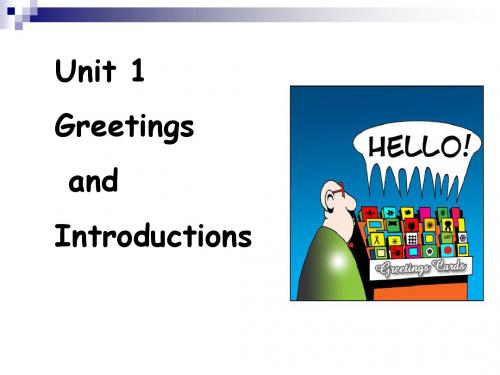
Thai
Koreans Japanese
Maori
Australian
Malaysia French
Do you know?
Every year, November 21 is World Hello Day. The objective is to say hello to ten people on the day. By greeting others, the message is for world leaders to use communication rather than using force to settle conflicts. 世界问候日”(World Hello Day)开始于1973 年11月21日,为促进埃及和以色列之间的和平 (当时正值第四次中东战争期间),来自澳大利 亚的姆可马克与米切尔兄弟两人,自费印刷了大 量有关问候的宣传材料寄给世界各国政府首脑及 世界知名人士,向他们阐述设立“世界问候日” 的重要意义,扩大“世界问候日”的影响,第一 个“世界问候日”诞生。
2. introduce A to B
把A介绍给B
派生词 introduce operate introduction
operation
action
act invent
v. +(t)ion
invention
n. 表示行为、状态
Warming-up
How many ways of greeting do you know?
planting area
[plɑ:ntɪŋ] [eəriə]
science area
[saɪəns]
construction area
八上仁爱英语书参考答案

八上仁爱英语书参考答案Unit 1: Greetings and Introductions1. Fill in the blanks with the correct form of the words given.- I am very (happy) to meet you.- She is (tall) than her sister.- He is (young) than his brother.- They are (friendly) than their classmates.2. Choose the best answer.- What’s your name?A. My name is Li Lei.B. I am Li Lei.C. I have a pen.D. I like apples.- Answer: A3. Complete the dialogue with the correct phrases.- A: Hi, I’m new here. My name is Tom.- B: Hello, Tom. I’m Jerry. (Nice to meet you).- A: (Nice to meet you), too.Unit 2: Daily Routines1. Rewrite the sentences in the past tense.- She brushes her teeth every morning.- He watches TV after dinner.2. Fill in the blanks with the correct prepositions.- I usually have breakfast (at) seven o'clock.- She goes to school (by) bus.3. Choose the correct question tag.- They go to the park, (do they/don’t they)?- Answer: don’t theyUnit 3: Hobbies and Interests1. Match the hobbies with their descriptions.- Reading books: A. Listening to music- Playing the guitar: B. Reading for pleasure- Singing: C. Playing a musical instrument2. Fill in the blanks with the correct form of the verbs given.- My sister (enjoy) listening to music.- He (like) to play basketball.3. Choose the correct sentence to complete the dialogue. - A: What do you usually do in your free time?- B: I usually play football. How about you?- A: I (like) to read books.Unit 4: Food and Drink1. Fill in the blanks with the correct comparative or superlative form of the adjectives given.- This apple is (bigger) than that one.- The cake is the (delicious) of all.2. Choose the correct sentence to complete the dialogue. - A: Would you like some more rice?- B: No, thank you. I’m (full).3. Rewrite the sentences as indirect speech.- She said, “I love chocolate.”- She said that she loved chocolate.Unit 5: Travel1. Fill in the blanks with the correct form of the verbs given.- They (go) to the beach last weekend.- I (want) to visit the museum next month.2. Choose the correct sentence to complete the dialogue. - A: Where did you go on your holiday?- B: I went to Paris. It was (wonderful).3. Rewrite the sentences in the passive voice.- They are building a new road.- A new road is being built.Unit 6: School Life1. Fill in the blanks with the correct form of the words given.- The teacher (explain) the lesson clearly.- We (study) hard to get good grades.2. Choose the correct sentence to complete the dialogue.- A: What time does the school bus arrive?- B: It usually arrives at (eight).3. Rewrite the sentences in the negative form.- She doesn’t like math.- They don’t have any homework today.Unit 7: Weather and Seasons1. Fill in the blanks with the correct form of the verbs given.- It (rain) heavily yesterday.- The weather (be) very hot in summer.2. Choose the correct sentence to complete the dialogue.- A: What’s the weather like today?- B: It’s (sunny).3. Rewrite the sentences as questions.- The sun rises in the east.- Does the sun rise in the east?Unit 8: Festivals and Celebrations1. Fill in the blanks with the correct form of the words given.- Christmas is a (happy) festival for children.- The Spring Festival is the most (important) festival in China.2. Choose the correct sentence to complete the dialogue. - A: What do you usually do on Mid-Autumn Festival? - B: We usually eat mooncakes and (admire) the moon.3. Rewrite the sentences in the past continuous tense. - They were watching TV when I arrived.- She was cooking dinner when the phone rang.Unit 9: Shopping1. Fill in the blanks with the correct form of the verbs given.-。
Unit 1 Greetings and Introductions(英语教程1)

Listening
Tapescript A. 1. base 4. luck 7. loud 10. rank
2. fire 3. clerk 5. funny 6. old 8. wander 9. help
Listening
Tapescript B.
Mrs. Fenton: Hello! I’m so happy to see you. Come in! Mrs. Hunt: Carol, you look wonderful. Mrs. Fenton: Thank you, Sarah—you look wonderful, too. And the children—they’re both so tall! Mrs. Hunt: Well—you haven’t seen them for five years. Mr. Hunt: Sarah, you’ve forgotten to introduce Sheila.
英语教程(修订版)
1
Unit 1 Greetings and Introductions
外语教学与研究出版社
Unit 1 Greetings and Introductions
1 2 3 4 Warming-up Listening
Reading
Speaking
5
6
Writing
Fun Time
Warming-up
B. base √
C. boss C. fire √ C. cluck C. look C. Tony C. Ed C. loud √ C. window C. held C. tank
Listening
B. You will hear a dialogue. It will be read twice. Listen carefully and choose the right answer to each question.
英语听说1教材参考答案
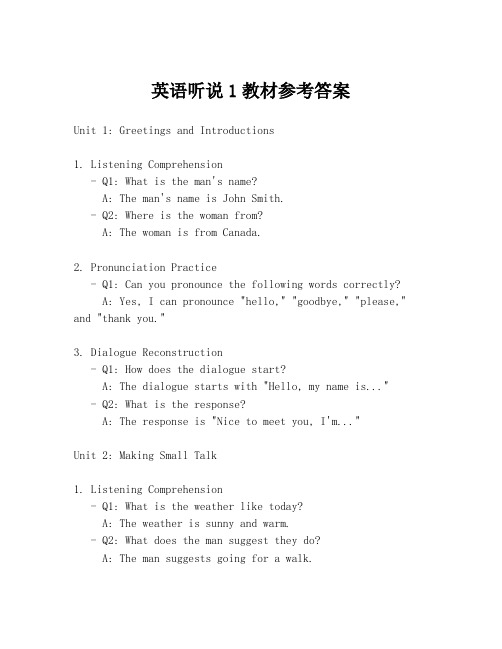
英语听说1教材参考答案Unit 1: Greetings and Introductions1. Listening Comprehension- Q1: What is the man's name?A: The man's name is John Smith.- Q2: Where is the woman from?A: The woman is from Canada.2. Pronunciation Practice- Q1: Can you pronounce the following words correctly? A: Yes, I can pronounce "hello," "goodbye," "please," and "thank you."3. Dialogue Reconstruction- Q1: How does the dialogue start?A: The dialogue starts with "Hello, my name is..."- Q2: What is the response?A: The response is "Nice to meet you, I'm..."Unit 2: Making Small Talk1. Listening Comprehension- Q1: What is the weather like today?A: The weather is sunny and warm.- Q2: What does the man suggest they do?A: The man suggests going for a walk.2. Vocabulary Building- Q1: Fill in the blanks with the correct words.A: The correct words are "weather," "sunny," "warm," "suggestion," and "walk."3. Role Play- Q1: What is the scenario?A: The scenario is two friends meeting at a park.- Q2: What are they discussing?A: They are discussing the weather and making plans for the day.Unit 3: Asking for Directions1. Listening Comprehension- Q1: Where is the man trying to go?A: The man is trying to go to the library.- Q2: What does the woman tell him to do?A: The woman tells him to turn left at the next intersection.2. Vocabulary Building- Q1: Match the following words with their meanings.A: The words are "directions," "intersection," "left," "right," and "library."3. Dialogue Reconstruction- Q1: What is the first question the man asks?A: The first question is "Excuse me, could you tell me how to get to the library?"- Q2: What is the woman's response?A: The woman's response is "Sure, just go straight and turn left at the next intersection."Unit 4: Making Arrangements1. Listening Comprehension- Q1: What time is the meeting scheduled for?A: The meeting is scheduled for 3 PM.- Q2: What does the man need to bring?A: The man needs to bring his laptop and a notebook.2. Vocabulary Building- Q1: Fill in the blanks with the correct words.A: The correct words are "meeting," "scheduled," "laptop," "notebook," and "bring."3. Dialogue Reconstruction- Q1: What is the purpose of the meeting?A: The purpose of the meeting is to discuss the project plan.- Q2: What does the woman remind the man?A: The woman reminds the man to bring his laptop and notebook.Unit 5: Describing Daily Routines1. Listening Comprehension- Q1: What time does the woman usually wake up?A: The woman usually wakes up at 7 AM.- Q2: What does the man do after work?A: The man goes to the gym after work.2. Vocabulary Building- Q1: Complete the sentences with the correct words.A: The correct words are "wake up," "routine," "work," "gym," and "evening."3. Dialogue Reconstruction- Q1: What does the woman do in the morning?A: The woman has breakfast and goes to work in the morning.- Q2: What is the man's evening routine?A: The man's evening routine includes going to the gym and reading.Unit 6: Discussing Hobbies and Interests1. Listening Comprehension- Q1: What is the woman's hobby?A: The woman's hobby is painting.- Q2: What does the man like to do in his free time?A: The man likes to play the guitar in his free time.2. Vocabulary Building- Q1: Match the following words with their meanings.A: The words are "hobby," "painting," "guitar," "free time," and "interest。
中职英语第一册-Unit-1-Greetings-and-introductions
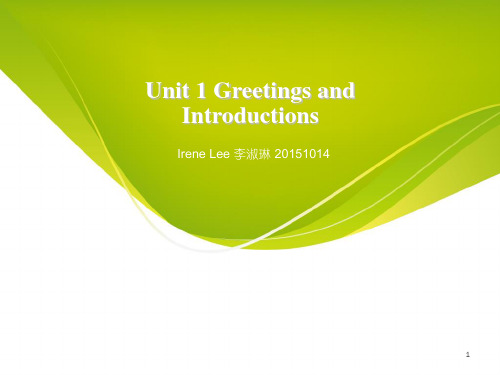
4
*call sb. up 给某人打电话 昨天他给我打电话了。
- He called me up yesterday.
4.vocational 职业的 adj. vocation 工作,职业 n. vacation 假期=holiday n.
5. 句型 How is it going? 熟人打招呼用语,
-ing 结尾的形容词,主语常指物,表 示“某物令人感到……”
类似的常考的几个词: boring 令人讨厌的 bored感到厌烦的 exciting令人兴奋的 excited感到激动的 surprising令人惊奇的 surprised感到好奇的
17
18
n. 兴趣 interest 4.代词(专门课题)
(sing).
7
Lesson 2 This is my friend Wang Tao.
1. meet v. 遇到 过去式→met 遇到某人 meet sb. 偶然遇到 meet with sb. - He met with a friend in the street. -The plan meets with our ideas. 符合 n. 集会 meet / meeting -We'll have a sports meeting next week.
8
2. customer 顾客,客户 3. pleased adj. 高兴的,满足的
Pleased/Nice/Glad to meet you.
4. Wang Tao speaks English very well. 说:speak, say, talk, tell
* speak 强调讲话这个动作,也指说某种语言
Unit 1 Greetings and Intபைடு நூலகம்oductions
初中 英语 笔记
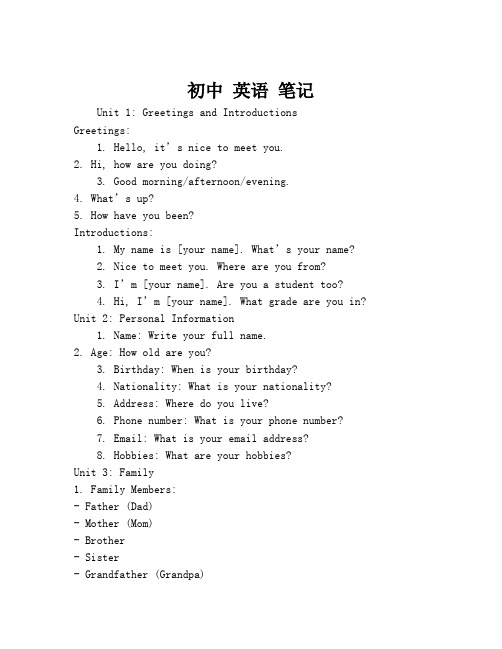
初中英语笔记Unit 1: Greetings and Introductions Greetings:1. Hello, it’s nice to meet you.2. Hi, how are you doing?3. Good morning/afternoon/evening.4. What’s up?5. How have you been?Introductions:1. My name is [your name]. What’s your name?2. Nice to meet you. Where are you from?3. I’m [your name]. Are you a student too?4. Hi, I’m [your name]. What grade are you in? Unit 2: Personal Information1. Name: Write your full name.2. Age: How old are you?3. Birthday: When is your birthday?4. Nationality: What is your nationality?5. Address: Where do you live?6. Phone number: What is your phone number?7. Email: What is your email address?8. Hobbies: What are your hobbies?Unit 3: Family1. Family Members:- Father (Dad)- Mother (Mom)- Brother- Sister- Grandfather (Grandpa)- Grandmother (Grandma)- Uncle- Cousin2. Describing Family Members:- My father is tall and has black hair.- My sister is younger than me.- My aunt is a teacher.Unit 4: School Life1. Subjects:- English- Science- History- Geography- Physical Education (PE)- Music2. Daily Routine:- Wake up in the morning- Brush teeth- Eat breakfast- Go to school- Attend classes- Have lunch- Participate in extracurricular activities - Study at home- Do homework- Eat dinner- Relax and rest- Go to bedUnit 5: Hobbies and Interests1. Hobbies:- Reading books- Playing sports- Watching movies- Listening to music- Drawing and painting- Playing musical instruments2. Interests:- Traveling and exploring new places- Learning about different cultures- Trying new food- Meeting new people- Playing video gamesRemember to review the vocabulary and grammar learned in each unit. Practicing and using the language regularly will help improve your English skills. Good luck!。
新编实用英语综合教程1笔记

新编实用英语综合教程1笔记一、Unit 1 Greetings and Introductions。
1. 重点词汇。
- greeting: n. 问候;招呼。
例如:A friendly greeting makes people feel warm.(一个友好的问候让人感觉温暖。
)- introduction: n. 介绍。
常见搭配:make an introduction(做介绍)。
例如:Let me make an introduction for you two.(让我给你们俩做个介绍。
)- self - introduction: 自我介绍。
例如:A good self - introduction can leave a good impression.(一个好的自我介绍能留下好印象。
)2. 常用句型。
- Nice to meet you.(很高兴见到你。
)回答通常是Nice to meet you, too.- How do you do?(你好!)回答也是How do you do? 这种表达比较正式。
- My name is...(我的名字是……)用于自我介绍。
例如:My name is Tom.I'm from China.(我的名字是汤姆。
我来自中国。
)二、Unit 2 At the Airport。
1. 重点词汇。
- airport: n. 机场。
例如:There are many people at the airport.(机场有很多人。
)- flight: n. 航班。
例如:What's the flight number?(航班号是多少?)- check - in: 办理登机手续。
例如:We need to go to the check - in counter.(我们需要去办理登机手续的柜台。
)- boarding pass: 登机牌。
例如:Show your boarding pass before boarding.(登机前出示你的登机牌。
初一英语笔记unit1
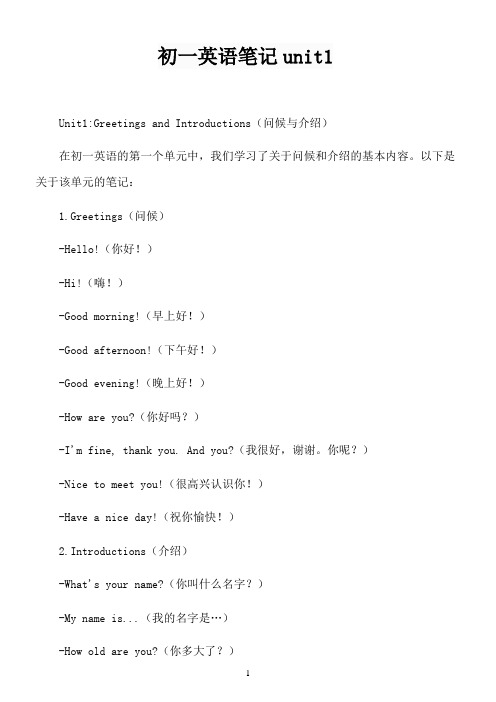
初一英语笔记unit1Unit1:Greetings and Introductions(问候与介绍)在初一英语的第一个单元中,我们学习了关于问候和介绍的基本内容。
以下是关于该单元的笔记:1.Greetings(问候)-Hello!(你好!)-Hi!(嗨!)-Good morning!(早上好!)-Good afternoon!(下午好!)-Good evening!(晚上好!)-How are you?(你好吗?)-I'm fine, thank you. And you?(我很好,谢谢。
你呢?)-Nice to meet you!(很高兴认识你!)-Have a nice day!(祝你愉快!)2.Introductions(介绍)-What's your name?(你叫什么名字?)-My name is...(我的名字是…)-How old are you?(你多大了?)-I'm twelve years old.(我十二岁。
)-Where are you from?(你来自哪里?)-I'm from China.(我来自中国。
)-What's your favorite color/food/sport?(你最喜欢的颜色/食物/运动是什么?)-My favorite color/food/sport is...(我最喜欢的颜色/食物/运动是…)-This is my friend...(这是我的朋友…)3.Classroom Language(课堂用语)-Sit down, please.(请坐。
)-Stand up.(站起来。
)-Open your book.(打开书。
)-Close your book.(合上书。
)-Listen to me carefully.(认真听我说。
)-Repeat after me.(跟我重复。
)-Can I go to the bathroom?(我可以去洗手间吗?)-May I ask a question?(我可以问个问题吗?)-I don't understand.(我不明白。
初一征服英语参考答案上册

初一征服英语参考答案上册Unit 1: Greetings and Introductions1. 根据课本内容,如何用英语进行自我介绍?- 首先,可以说“My name is [你的名字]”来介绍自己的名字。
接着,可以加上“I'm from [你的家乡]”来说明你来自哪里。
如果愿意,还可以说“I'm 12 years old”来告诉别人你的年龄。
2. 英语中如何询问别人的姓名?- 你可以问“What's your name?”或者“May I know your name?”来询问别人的姓名。
3. 英语中如何询问别人来自哪里?- 你可以说“Where are you from?”或者“Can you tell me where you come from?”来询问别人的家乡。
4. 英语中如何询问别人的年龄?- 你可以问“How old are you?”或者“What is your age?”来询问别人的年龄。
Unit 2: Numbers and Counting1. 英语中1到10的数字怎么读?- 1 - One, 2 - Two, 3 - Three, 4 - Four, 5 - Five, 6 - Six, 7 - Seven, 8 - Eight, 9 - Nine, 10 - Ten2. 如何用英语数数?- 从1开始数,每增加一个单位就使用下一个数字。
例如,从1数到5就是“One, Two, Three, Four, Five”。
3. 英语中如何表达“第一”到“第十”?- First, Second, Third, Fourth, Fifth, Sixth, Seventh, Eighth, Ninth, TenthUnit 3: Colors and Shapes1. 英语中基本颜色的单词有哪些?- Red, Blue, Yellow, Green, Orange, Purple, Pink, Black, White, Brown2. 如何用英语描述形状?- Circle - 圆形,Square - 正方形,Rectangle - 长方形,Triangle - 三角形,Star - 星形,Heart - 心形3. 英语中如何询问某物的颜色?- 你可以说“What color is it?”或者“What's the color of this [物品]?”Unit 4: Family and Relationships1. 英语中家庭成员的称呼有哪些?- Father, Mother, Brother, Sister, Grandfather, Grandmother, Uncle, Aunt, Cousin2. 如何用英语介绍家庭成员?- 可以说“This is my [称呼], [家庭成员的名字]”。
中等职业英语基础模块第一册单词
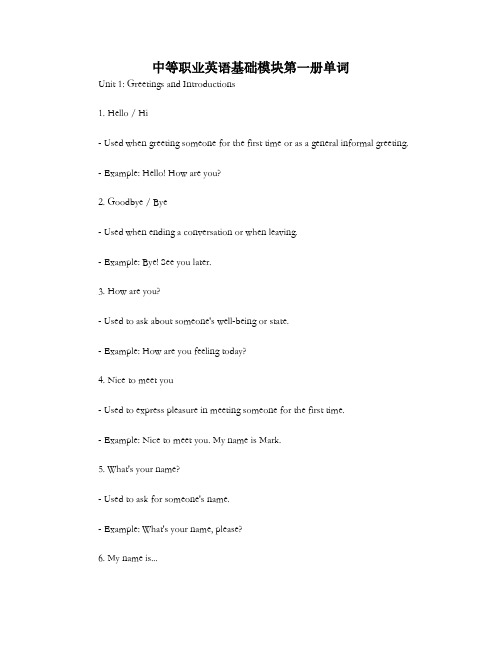
中等职业英语基础模块第一册单词Unit 1: Greetings and Introductions1. Hello / Hi- Used when greeting someone for the first time or as a general informal greeting. - Example: Hello! How are you?2. Goodbye / Bye- Used when ending a conversation or when leaving.- Example: Bye! See you later.3. How are you?- Used to ask about someone's well-being or state.- Example: How are you feeling today?4. Nice to meet you- Used to express pleasure in meeting someone for the first time.- Example: Nice to meet you. My name is Mark.5. What's your name?- Used to ask for someone's name.- Example: What's your name, please?6. My name is...- Used to introduce oneself and provide the name.- Example: My name is Emily. Nice to meet you.7. Where are you from?- Used to ask about someone's place of origin.- Example: Where are you from originally?8. I'm from...- Used to state one's place of origin.- Example: I'm from France. What about you?9. How old are you?- Used to ask about someone's age.- Example: May I ask how old you are?10. I'm... years old.- Used to state one's age.- Example: I'm 25 years old. How about you?Unit 2: Numbers1. Zero- The numerical symbol representing the value of nothing or no quantity. - Example: There are zero seats available.- The numerical symbol representing the value of a single unit or entity. - Example: I have one sister.3. Two- The numerical symbol representing the value of two units or entities. - Example: I need two cups of coffee.4. Three- The numerical symbol representing the value of three units or entities. - Example: I have three cats.5. Four- The numerical symbol representing the value of four units or entities. - Example: There are four chairs in the room.6. Five- The numerical symbol representing the value of five units or entities. - Example: I have five fingers on each hand.7. Six- The numerical symbol representing the value of six units or entities. - Example: She has six books on her shelf.- The numerical symbol representing the value of seven units or entities. - Example: We'll meet at seven o'clock.9. Eight- The numerical symbol representing the value of eight units or entities. - Example: I'll be there in eight minutes.10. Nine- The numerical symbol representing the value of nine units or entities. - Example: There are nine planets in our solar system.Unit 3: Colors1. Red- The color associated with passion, love, and intensity.- Example: She was wearing a stunning red dress.2. Blue- The color associated with calmness, serenity, and stability.- Example: The sky is a beautiful shade of blue today.3. Yellow- The color associated with happiness, joy, and energy.- Example: The sunflowers are bright yellow.4. Green- The color associated with nature, growth, and freshness.- Example: The leaves on the trees are a vibrant green.5. Orange- The color associated with enthusiasm, creativity, and warmth. - Example: He painted the walls in a lovely shade of orange. 6. Purple- The color associated with royalty, luxury, and power.- Example: The queen wore a regal purple gown.7. Pink- The color associated with femininity, sweetness, and kindness. - Example: The baby girl's room is painted in soft pink.8. Brown- The color associated with earthiness, stability, and reliability. - Example: His eyes are a warm shade of brown.9. Black- The color associated with formality, elegance, and mystery.- Example: She wore a black evening gown to the party.10. White- The color associated with purity, innocence, and cleanliness.- Example: The bride wore a white wedding dress.This document provides a comprehensive list of basic words related to the Middle Vocational English Module 1. The topics covered include greetings and introductions, numbers, and colors. Each unit contains ten words, along with brief explanations and examples. These words will help you build a solid foundation in the English language.。
中职英语第一册Unit 1 Greetings and Introductions知识复习
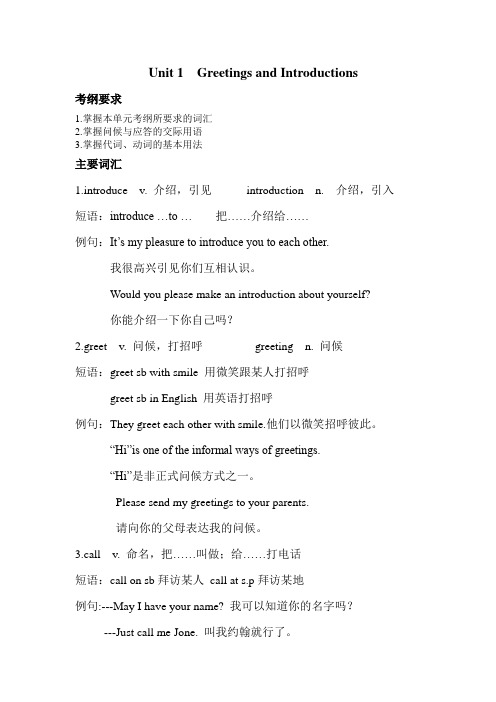
Unit 1 Greetings and Introductions考纲要求1.掌握本单元考纲所要求的词汇2.掌握问候与应答的交际用语3.掌握代词、动词的基本用法主要词汇1.introduce v. 介绍,引见introduction n. 介绍,引入短语:introduce …to … 把……介绍给……例句:It’s my pleasure to introduce you to each other.我很高兴引见你们互相认识。
Would you please make an introduction about yourself?你能介绍一下你自己吗?2.greet v. 问候,打招呼greeting n. 问候短语:greet sb with smile 用微笑跟某人打招呼greet sb in English 用英语打招呼例句:They greet each other with smile.他们以微笑招呼彼此。
“Hi”is one of the informal ways of greetings.“Hi”是非正式问候方式之一。
Please send my greetings to your parents.请向你的父母表达我的问候。
3.call v. 命名,把……叫做;给……打电话短语:call on sb拜访某人call at s.p拜访某地例句:---May I have your name? 我可以知道你的名字吗?---Just call me Jone. 叫我约翰就行了。
Yesterday I called on my uncle/called at my uncle’s.昨天我拜访了我的叔叔。
4.vocational adj. 职业的vocation n. 职业短语:vocational school 职业学校vocational education 职业教育例句:I’ m studying in a vocational school of Qingdao.我在青岛的一所职业学校学习。
现代大学英语精读1(第三版)教师用书Unit1
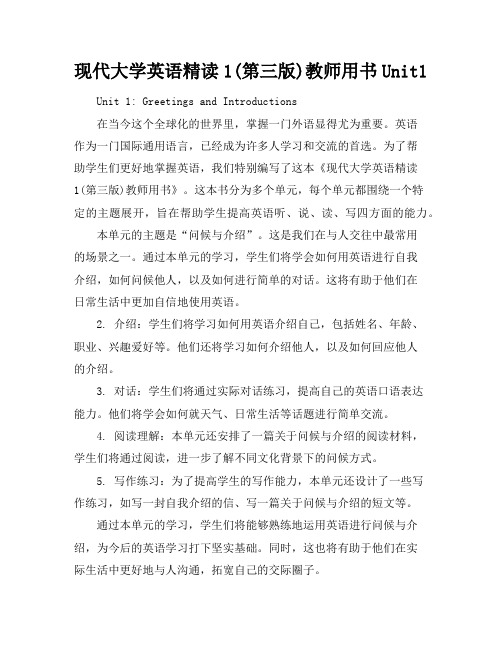
现代大学英语精读1(第三版)教师用书Unit1 Unit 1: Greetings and Introductions在当今这个全球化的世界里,掌握一门外语显得尤为重要。
英语作为一门国际通用语言,已经成为许多人学习和交流的首选。
为了帮助学生们更好地掌握英语,我们特别编写了这本《现代大学英语精读1(第三版)教师用书》。
这本书分为多个单元,每个单元都围绕一个特定的主题展开,旨在帮助学生提高英语听、说、读、写四方面的能力。
本单元的主题是“问候与介绍”。
这是我们在与人交往中最常用的场景之一。
通过本单元的学习,学生们将学会如何用英语进行自我介绍,如何问候他人,以及如何进行简单的对话。
这将有助于他们在日常生活中更加自信地使用英语。
2. 介绍:学生们将学习如何用英语介绍自己,包括姓名、年龄、职业、兴趣爱好等。
他们还将学习如何介绍他人,以及如何回应他人的介绍。
3. 对话:学生们将通过实际对话练习,提高自己的英语口语表达能力。
他们将学会如何就天气、日常生活等话题进行简单交流。
4. 阅读理解:本单元还安排了一篇关于问候与介绍的阅读材料,学生们将通过阅读,进一步了解不同文化背景下的问候方式。
5. 写作练习:为了提高学生的写作能力,本单元还设计了一些写作练习,如写一封自我介绍的信、写一篇关于问候与介绍的短文等。
通过本单元的学习,学生们将能够熟练地运用英语进行问候与介绍,为今后的英语学习打下坚实基础。
同时,这也将有助于他们在实际生活中更好地与人沟通,拓宽自己的交际圈子。
现代大学英语精读1(第三版)教师用书Unit1Unit 1: Greetings and Introductions在本单元的学习中,我们将探讨如何以自然、流畅的方式用英语进行问候与介绍。
通过一系列精心设计的活动和练习,学生们将逐步提高他们的英语交际能力。
我们将关注如何在不同场合下恰当地使用问候语。
例如,在正式场合,如商务会议或学术交流中,使用“Goodmorning/afternoon/evening”会更加得体;而在朋友聚会或休闲场合,简单的“Hi”或“Hello”就足够了。
英语综合教程参考答案
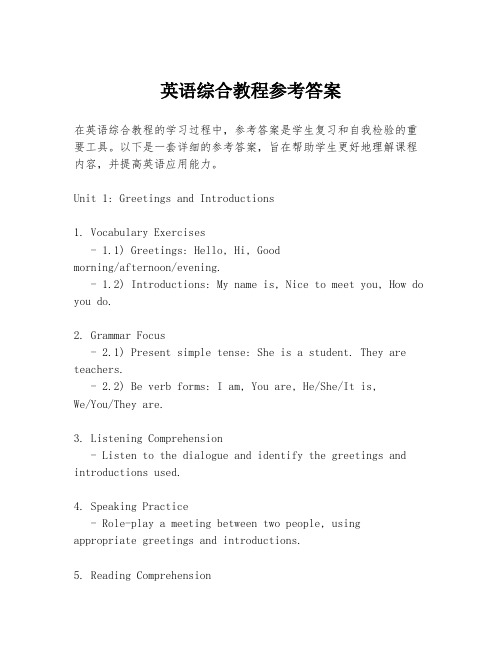
英语综合教程参考答案在英语综合教程的学习过程中,参考答案是学生复习和自我检验的重要工具。
以下是一套详细的参考答案,旨在帮助学生更好地理解课程内容,并提高英语应用能力。
Unit 1: Greetings and Introductions1. Vocabulary Exercises- 1.1) Greetings: Hello, Hi, Goodmorning/afternoon/evening.- 1.2) Introductions: My name is, Nice to meet you, How do you do.2. Grammar Focus- 2.1) Present simple tense: She is a student. They are teachers.- 2.2) Be verb forms: I am, You are, He/She/It is,We/You/They are.3. Listening Comprehension- Listen to the dialogue and identify the greetings and introductions used.4. Speaking Practice- Role-play a meeting between two people, using appropriate greetings and introductions.5. Reading Comprehension- Read the passage about different ways to greet people in various cultures and answer the questions.6. Writing Task- Write a short paragraph introducing yourself to a new classmate.Unit 2: Daily Routines1. Vocabulary Exercises- 1.1) Daily activities: Wake up, brush teeth, have breakfast, go to school/work.- 1.2) Time expressions: At, in themorning/afternoon/evening, on time, late.2. Grammar Focus- 2.1) Present continuous tense: She is having breakfast. They are going to school.- 2.2) Adverbs of frequency: Always, usually, sometimes, never.3. Listening Comprehension- Listen to the descriptions of daily routines and match them with the correct person.4. Speaking Practice- Discuss your daily routine with a partner and ask questions about theirs.5. Reading Comprehension- Read about different daily routines of people fromaround the world.6. Writing Task- Write a diary entry describing your typical day.Unit 3: Food and Dining1. Vocabulary Exercises- 1.1) Food items: Apple, pizza, rice, steak.- 1.2) Dining expressions: Order, serve, enjoy, delicious.2. Grammar Focus- 2.1) Present perfect tense: I have eaten. They have tried.- 2.2) Modal verbs: Can, could, may, might.3. Listening Comprehension- Listen to a conversation at a restaurant and note the food ordered.4. Speaking Practice- Practice ordering food at a restaurant with a partner.5. Reading Comprehension- Read about various types of cuisine from around the world.6. Writing Task- Write a review of a restaurant you recently visited.Unit 4: Travel and Transportation1. Vocabulary Exercises- 1.1) Modes of transportation: Car, train, plane, bus.- 1.2) Travel phrases: Departure, arrival, ticket, luggage.2. Grammar Focus- 2.1) Future simple tense: I will travel. They will go.- 2.2) Future continuous tense: She will be traveling.They will be arriving.3. Listening Comprehension- Listen to travel plans and identify the mode of transportation used.4. Speaking Practice- Discuss your ideal vacation and how you would get there.5. Reading Comprehension- Read about different travel destinations and their attractions.6. Writing Task- Write a travel itinerary for a trip you would like to take.Unit 5: Work and Career1. Vocabulary Exercises- 1.1) Job titles: Teacher, doctor, engineer, manager.- 1.2) Workplace expressions: Interview, promotion, office, project.2. Grammar Focus- 2.1) Passive voice: The project is managed by her. The interview will be conducted.- 2.2) Conditional sentences: If I get the job, I willmove to a new city.3. Listening Comprehension- Listen to job interviews and identify the qualifications of the candidates.4. Speaking Practice- Role-play a job interview with a partner.5. Reading Comprehension- Read about different career paths and their requirements.6. Writing Task- Write a cover letter for a job application.Unit 6: Hobbies and Interests1. Vocabulary Exercises- 1.1) Hobbies: Reading, painting, playing。
新编大学英语视听说教程听力原文
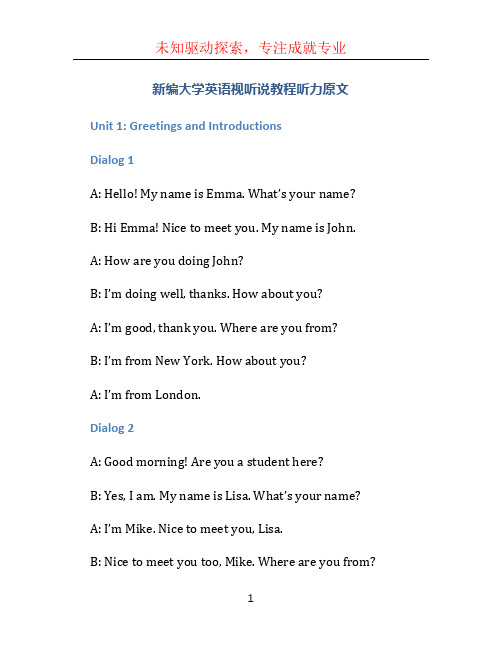
新编大学英语视听说教程听力原文Unit 1: Greetings and IntroductionsDialog 1A: Hello! My name is Emma. What’s your name? B: Hi Emma! Nice to meet you. My name is John. A: How are you doing John?B: I’m doing well, thanks. How about you?A: I’m good, thank you. Where are you from?B: I’m from New York. How about you?A: I’m from London.Dialog 2A: Good morning! Are you a student here?B: Yes, I am. My name is Lisa. What’s your name? A: I’m Mike. Nice to meet you, Lisa.B: Nice to meet you too, Mike. Where are you from?A: I’m from Los Angeles. How about you?B: I’m from Beijing.Unit 2: Making PlansDialog 1A: Hi Sam. What are you doing this weekend?B: I don’t have any plans. What about you?A: I’m thinking of going hiking. Would you like to join me?B: That sounds fun. I’d love to come along.Dialog 2A: Hey Emily, do you have any plans for tomorrow evening?B: Not really. What do you have in mind?A: There’s a new movie showing at the cinema. Would you like to watch it together?B: Sure! I’ve been wanting to see that movie. Let’s go.Unit 3: Asking for HelpDialog 1A: Excuse me. Can you help me find the nearest post office?B: Of course. Go straight down this road, and you’ll see it on your left.A: Thank you so much!B: You’re welcome. Have a nice day!Dialog 2A: Pardon me, do you know where the library is?B: Yes, it’s just around the corner. Walk straight ahead, and you’ll see it on your right.A: Thank you very much!B: No problem. Enjoy your time at the library.Unit 4: Describing PeopleDialog 1A: Do you know T om? He’s a tall guy with short blonde hair.B: Yes, I know him. He’s also got blue eyes.A: That’s correct. He’s quite good-looking.Dialog 2A: Have you met Alice? She’s a woman with long brown hair. B: Yes, I’ve seen her around. She’s always smiling.A: She’s really friendly and easygoing.Unit 5: Ordering FoodDialog 1A: Waiter, can we see the menu please?Waiter: Of course. Here you go.A: Thank you. I’ll have the steak and a glass of red wine. Waiter: Excellent choice.Dialog 2A: Excuse me, can I have the bill please?Waitress: Sure. Here you are.A: Thank you. How much is it?Waitress: It’s 25 dollars.A: Here’s the money. Keep the change.Waitress: Thank you for your generosity.Unit 6: Giving DirectionsDialog 1A: Excuse me, I’m looking for the nearest post office. Can you help me?B: Sure. Go straight ahead until you reach the traffic lights, then turn left. The post office will be on your right.A: Thanks a lot.B: You’re welcome. Have a great day!Dialog 2A: Hi, do you know where the train station is?B: Yes, it’s just a few blocks away. Go down this street, and you’ll find it on your left.A: Thank you so much!B: No problem. Enjoy your journey.以上是新编大学英语视听说教程的一些听力原文对话。
unit_1_Greetings_and_Introductions

interesting也是形容词,意为“令人感兴趣的”, 既可以作表语,也可以作定语。 如: The story is very interesting. 这个故事很 有趣。
spell v.
Do you know how to spell the word ? The spelling of the word is g-r-e-e-t.
How are you? Hello/Hi! Nice/Pleased/Glad to meet you. How are you doing?
How is everything/life/ your vocation/holiday/weekend?
How do you do?
More practice
call v. 把…叫做
You can call me Miss zhang.
Miss. 小姐,中小学女教师 Mrs. 夫人, 太太 Mr. 先生
○He
often calls on me. called at Mr. Jame‟s this afternoon.
call on sb. call at a place
Good morning ! I am from Rizhao.
I am a worker. What do you do? I work on a farm.
Task 3 Questions and answers 问答练习
1、Formal 正式场合的打招呼和介绍 正式 How do you do ? My name is…. Pleased/ Glad to meet you. 回应 How do you do? I‟m…. Pleased/ Glad to meet you, too.
初升高衔接教材的答案英语

初升高衔接教材的答案英语Unit 1: Greetings and IntroductionsPart 1: Vocabulary1. Hello - 你好2. Good morning - 早上好3. How are you? - 你好吗?4. I'm fine, thank you. - 我很好,谢谢。
5. What's your name? - 你叫什么名字?6. My name is... - 我叫...Part 2: Grammar1. Use "is" for singular nouns. For example: "My name is John."2. Use "are" for plural nouns. For example: "These books are interesting."3. Use "am" with "I". For example: "I am a student."Part 3: Reading ComprehensionText: "Hello, my name is Mary. I am a new student. How are you?"Answer: Mary is a new student and she is asking about the other person's well-being.Part 4: Listening ExerciseListen to the dialogue and answer the following questions: - What is the boy's name?- Where is he from?- What does he like to do?Unit 2: Daily RoutinesPart 1: Vocabulary1. Wake up - 醒来2. Brush teeth - 刷牙3. Have breakfast - 吃早餐4. Go to school - 上学5. Have lunch - 吃午餐6. Afternoon - 下午Part 2: Grammar1. Use the present simple tense to talk about routines. For example: "I wake up at 7 o'clock every morning."2. Use "usually", "often", "sometimes", "never" to describe frequency. For example: "I usually have breakfast before going to school."Part 3: Reading ComprehensionText: "Every day, I wake up at 6:30 am. I brush my teeth and have breakfast. Then I go to school by bus."Answer: The person wakes up at 6:30 am, brushes their teeth, has breakfast, and goes to school by bus.Part 4: Writing ExerciseWrite a short paragraph about your daily routine.Unit 3: School SubjectsPart 1: Vocabulary1. Mathematics - 数学2. Science - 科学3. History - 历史4. Geography - 地理5. English - 英语6. Art - 艺术Part 2: Grammar1. Use "like" and "dislike" to express preferences. For example: "I like English."2. Use "best" and "worst" to talk about the most and least favorite subjects. For example: "Mathematics is my best subject."Part 3: Reading ComprehensionText: "My favorite subject is science because it's interesting. I dislike history because it's boring." Answer: The person's favorite subject is science and theyfind history boring.Part 4: Speaking ExerciseDiscuss with a partner about your favorite and least favorite subjects and why.Unit 4: Hobbies and InterestsPart 1: Vocabulary1. Reading - 阅读2. Playing sports - 做运动3. Drawing - 画画4. Dancing - 跳舞5. Singing - 唱歌6. Traveling - 旅行Part 2: Grammar1. Use "enjoy" to talk about activities you like doing. For example: "I enjoy reading books."2. Use "would rather" to compare preferences. For example: "I would rather play sports than watch TV."Part 3: Reading ComprehensionText: "In my free time, I enjoy playing the guitar and listening to music. I also like to travel and explore new places."Answer: The person enjoys playing the guitar, listening to music, and traveling.Part 4: Group DiscussionDiscuss with your group what hobbies and interests you all share.End of Unit ExercisesThis concludes the English section of the initial high school transition material. It is important to practice regularly and engage in activities that will help you become more comfortable with the language. Remember, practice makes perfect!。
Unit1_Greetings_and_Introductions

Task 2
a.计算机 b. 拼写
c. 秘书
d. 打招呼 e. 老板 f. 介绍 g.职业的 h.把…叫作
6. secretary
7. boss
8. computer
practice
1.May I i________ my friend to you? Her name is Wang Fang. ntroduce 2. How do you s______ your name? pell 3. I finished from a v_________ school two years ago. ocational 4. I’m very interested in c_______ study. omputer ecretary 5. This is Miss Yang, my s________.
派生词 n.+ -al vocation
nation culture nature 国家 文化 自然
adj 职业的
国家的 文化的 自然的 national cultural natural
职业、行业 vocational
n. 名词 secretary [′sekrətərɪ ] a person who does office work
operation
action
act invent
v. +(t)ion
invention
n. 表示行为、状态
greet [grɪːt] v. say hello to sb 打招呼,问好 Can you greet people in English? 你会用英语打招呼吗?
greet people in English
英语基础模块2第一单元范文

英语基础模块2第一单元范文Unit 1: Greetings and IntroductionsIn this unit, we will learn how to greet people and introduce ourselves in English. Greetings are an important part of communication, as they set the tone for the conversation and show respect for the person you are speaking to. Introductions are also crucial in forming new relationships and making a good first impression.Greetings:1. Hello! - This is the most common way to greet someone in English. It can be used in both formal and informal situations.2. Hi! - This is a more casual greeting and is often used with friends and acquaintances.3. Good morning/afternoon/evening! - These greetings are used at specific times of the day and show politeness.4. How are you? - This is a common greeting that shows interest in the other person's well-being.5. What's up? - This is a casual and friendly way to greet someone and ask how they are doing.Introductions:1. My name is... - Use this phrase to introduce yourself and give your name.2. Nice to meet you! - Say this when you meet someone for the first time to show that you are happy to make their acquaintance.3. This is... - Use this phrase to introduce someone else to a third party.4. It's a pleasure to meet you. - Use this polite phrase to show respect and gratitude when meeting someone new.5. Allow me to introduce myself. - Use this formal phrase when introducing yourself in a professional setting.Practice these greetings and introductions with friends, family, and colleagues to improve your English speaking skills. Remember to always be polite and respectful when greeting and introducing yourself to others.。
- 1、下载文档前请自行甄别文档内容的完整性,平台不提供额外的编辑、内容补充、找答案等附加服务。
- 2、"仅部分预览"的文档,不可在线预览部分如存在完整性等问题,可反馈申请退款(可完整预览的文档不适用该条件!)。
- 3、如文档侵犯您的权益,请联系客服反馈,我们会尽快为您处理(人工客服工作时间:9:00-18:30)。
Task 4: Role Play
• 师生打招呼 A: 你是一名新生,遇见一位教师,跟他打 招呼。 B:你是一位教师,一名新生跟你打招呼, 你也跟他打招呼。
A: How do you do? B: How do you do?
• 同学和同学打招呼 A: 今天早上你遇见了 你的同班同学,向他 打招呼。
Task 1: match
• • • • • • • • 1. introduce 2. greet 3. spell 4. vocational 5. call 6. secretary 7. boss 8. computer a. 计算机 b. 拼写 c. 秘书 d. 打招呼 e. 老板 f. 介绍 g. 职业的 h. 把---- 叫做
B:你的同班同学向你 打招呼,你也向他打 招呼。
1
A: Hi! Wang Lin! How are you? B: Fine, thank you. And you?
2
A: Hi! Wang Lin! How is it going? B: Great/ Fine! How is it going with you?
Task 3: exercises(1)
1. Hello, I’m Zhang Li. What’s your name? ( c ) 1. How do you spell that? ( b ) 2. Lily Smith. Nice to meet you. ( a )
a. Nice to meet you, too. b. Hi! I’m Lily Smith. Call me Lily. c. L-I-L-Y, Lily; S-M-I-T-H, Smith.
sentence patterns(二)
• 朗读并掌握下列句型: 1. A: Hello! B: Hi! 2. A: How are you? B: I am fine. Thank you. 3. A: Nice to meet you. B: Nice to meet you, too. 4. A: Hi! How is it going? (近来怎么样?) B: Great! How is it going with you?(意思同上) 5. A: How do you spell your name? B: A-L-I-C-E, Alice.
Task 3: exercБайду номын сангаасses(2)
1. Morning. ( c ) 2. It’s a nice day, isn’t it? ( b ) 3. I’m a student. What do you do? ( a )
a. Oh, I work in a bank. b. Yes, it is. c. Morning.
Task 2
sentence patterns(一)
• 日常生活中,人们打招呼常用的句型: 1. ------- How are you? ------- Fine, thank you. (and you?) 2. ------- Nice/ Glad to meet/ see you. ------- I’m ------(glad to see you, too.) 3. ------- where are you from? ------- I’m / I come from -----. 4. ------- Let me introduce ----------- My name is ----- / This is -------.
总结
• 课后复习本单元的新词汇
• 掌握向别人问候的方式 (1)向陌生人打招呼的句型 (2)向熟悉人打招呼的句型
Unit 1 Greetings and Introductions
适用班级:09级中专部
本课学习目标:
By the end of the lesson,you will be able to 1. Repeat and write the new words correctly 正确跟读并听写生词 2. Greet people in a proper way 用恰当的方式问好
